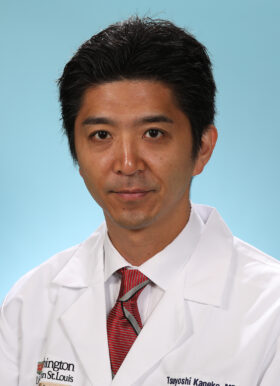Tsuyoshi Kaneko, MD

Tsuyoshi Kaneko, MD, is a cardiothoracic surgeon. To schedule an appointment, please call 314-362-7260.
How did you know you wanted to become a doctor?
My father was a general surgeon, and this had much influence. In my elementary school graduation book, I wrote that I wanted to be a surgeon as my future profession.
What happened in the course of schooling to influence you to choose your specialty?
Again, I was set on becoming a surgeon, given my family background. In my final year of medical school, I had an opportunity to rotate in the United States in cardiothoracic surgery. I was fascinated with the teamwork, complexity and elegance of cardiac surgery. This determined my decision to come to the United States to train in cardiac surgery.
What brought you to Washington University?
After training and staying on as faculty at the Brigham and Women’s Hospital in Boston, I was asked to serve as the chief of cardiac surgery at Washington University. With the rich history and numerous innovations that came out of this institution, it was a true honor, and I was delighted to come to St. Louis.
Which aspect of your practice is most interesting?
It’s the complex patient population that I treat, using either minimally invasive technology with transcatheter valves or traditional, but innovative, cardiac surgery, based on the patient’s need. Treating cardiac surgery patients is fascinating, and using different techniques to provide the best care for the patient is very satisfying.
What is a transcatheter aortic valve replacement (TAVR)?
TAVR is intubated technology developed over the past decade. It allows the replacement of the valve through the groin vessels without opening the chest. The valve goes inside the old valve and pushes the side, while the new valve starts functioning. In 2023, TAVR is performed more frequently than traditional surgical aortic valve replacement.
What is the benefit of minimally invasive surgery?
Minimally invasive surgery means the patient’s body will have less trauma and a faster recovery. It is quite amazing to see a difference in some patients. This may involve surgery through a small incision, or procedures with a needle, such as TAVR. I have had patients playing golf a week after TAVR. On the other hand, certain patients will be more suitable for traditional surgery to have better long-term benefits.
Are there any other new developments in your field that you are excited about?
There are unbelievable innovations that continue to happen in the field of cardiac surgery. Innovations with transcatheter valves allow us to treat patients that we were previously unable to treat. New developments in heart failure include new devices supporting the heart muscles and new techniques for transplants. Our team is at the forefront of these innovations.
Where are you from?
I am originally from Tokyo, Japan. I grew up from age 10-12 near Hartford, Connecticut.
Which particular award or achievement is most gratifying?
The award I am most proud of is the William McGoon Award from the Thoracic Surgery Resident Association. I was chosen as the best teacher by residents nationally. It is extremely satisfying to train the new generation of surgeons that will continue the legacy of surgical experts who paved the way.
What is the best advice you’ve received?
One of my mentors told me always to be bold. I continue to think about this to make a difference.
If you weren’t a doctor, what would you like to be doing?
One of the professions that I wanted to be when I was 10 years old was a news anchor.